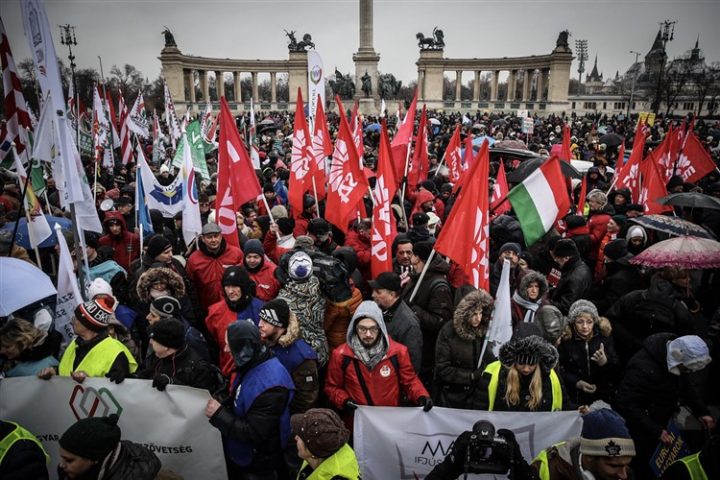The wave of protests that started in December resumed last week with several smaller protests all over different towns of Hungary culminating in a larger demonstration in Budapest on Saturday.
Not long before Christmas, the Hungarian Parliament passed the Overtime Act that allows individual and collective agreements to permit 400 hours of yearly overtime and a three-year overtime banking period along with the law creating new administrative courts that outsources cases against state authorities to a parallel court system directly overseen by the Minister of Justice. Opposition MPs tried to obstruct the vote by not allowing the Speaker access to the Speaker’s podium, but that did not work as the Speaker opened the session from his seat on the floor allowing Fidesz’s parliamentary supermajority to steam ahead amongst the sounds of the whistles and sirens of the otherwise powerless opposition.
The ensuing protests were somewhat unprecedented – representatives of all opposition parties participated in them and shared the same stage holding speeches with messages of unity and cooperation. One of these protests ended up at the headquarters of the Hungarian state media, where opposition leaders attempted to make state news channel M1 broadcast the five demands of the opposition. After MPs held a fruitless night-long sit-in at the public media offices where only security staff was willing to talk to them, that same security staff ended up unlawfully throwing the MPs out of the building using physical force, going as far as assaulting one of the members of Parliament.
The destination of last year’s final march against the government was the Sándor Palace in Budapest where the President of the Republic, János Áder resides who signed both laws into effect just days before Christmas. Those speaking at the rally emphasised that the demonstrations at the end of 2018 were only the beginning and more were to come in the new year. Trade union leaders said they will begin organising the general strike that was provisioned if Áder were to sign the Overtime Act.
Saturday’s march in Budapest
As promised, the demonstrations resumed this year. Last Saturday protesters began gathering on Heroes’ Square in Budapest around 2:00 PM from where they walked across the city to Kossuth square. Several thousand people occupied the area in front of the main gate of the Parliament where representatives of trade unions, civil society, and opposition parties held their speeches. Almost all of them lauded the political unity of the opposition, urged Hungarians to join trade unions, political parties, and create strong communities that can gain significant leverage to defend their interests.
MSZP’s president, Bertalan Tóth mentioned the possibility of the opposition cooperating at the European Parliamentary Elections of 2019 but did not mention any specifics. Antal Csárdi, an MP of opposition party LMP invited all trade unions and opposition parties to begin talks about drafting a new, completely revised Labour Code. Gergely Karácsony, the former PM-candidate of MSZP and Párbeszéd added that the government’s “divide and conquer” strategy will no longer work, as there is unity amongst trade unions, opposition parties, civil society, and freedom-loving Hungarians.

The new element in Saturday’s speeches was that the focus seems to be shifting from rejecting Orbán’s government to rejecting Orbán’s system of government. Ákos Hadházy said that unless the five opposition demands (that you can find in this article) are met, the elections are nothing more than political theatre. Csaba Molnár, MP of Democratic Coalition stressed that they are not protesting individual terrible laws but the entire system made up of these individual terrible laws, and several speakers including opposition MP Bernadett Szél called for a new “regime change”. This phrase might not mean much outside of Hungary, but this is loaded terminology – it refers to the 1989 regime change that, after a 40-year dictatorship, brought about the fall of the one-party socialist system and the rise of pluralist democracy and the first free elections in 1990.
Most people went home after the speeches, some stayed in front of the Parliament for a while, but the rest of the night remained peaceful and uneventful except for the occasional pops of fireworks left-over from the New Year’s Eve celebrations.
What’s next?
There is no specific date yet for the general strike that was promised by trade union leaders, but protests will resume in Budapest and in other towns of Hungary on 19 January with nationwide demonstrations and roadblocks. A group called Radical European Democrats will demonstrate in Brussels at the Robert Schuman square on Tuesday at 5:00 PM. The list of speakers includes MEP Judith Sargentini, whose report initiated the current Article 7 proceedings against Hungary, and representatives of the Hungarian opposition parties.






